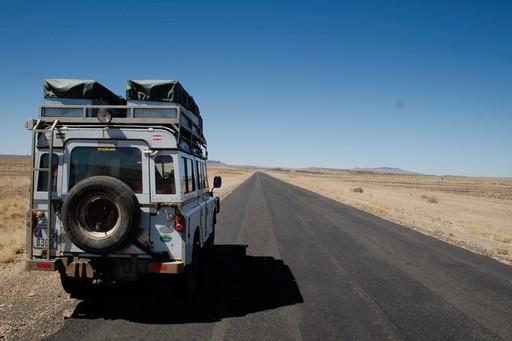Our most important overland Africa Navigation device was a Garmin mit the software tracks4Africa.
Overland navigation in Africa can be a challenging but rewarding experience due to the continent’s diverse landscapes, often rugged terrain, and varying climatic conditions. Whether you are traveling for tourism, research, or humanitarian purposes, it’s essential to plan your journey carefully and prioritize safety. Here are some tips for overland navigation in Africa:

- Research and Planning:
- Start by researching the specific countries and regions you plan to visit. Africa is a vast continent with varying political and safety conditions, so stay updated on travel advisories and entry requirements. What we did we studied tracks4africa a collection of GPS maps carefully and planned ahead the campsites in Africa which are available. And for road conditions we used the old Michelin paper map which provides valuable information especially for regions that are periodically wet or flooded.
- Obtain the necessary visas, permits, and vaccinations for your intended destinations. Depending on the length of your planned trip, that cannot be completely done from your home country. Make visas for the first 2 or 3 countries you intend to travel to and then make the visas in the country before the country you want to visit at their local embassies.
- Create a detailed itinerary with key waypoints, distances, and estimated travel times. Here tracks4africa or google maps is a great help.
- Navigation Tools:
- Invest in reliable navigation tools. A GPS device, smartphone with GPS capabilities, or a dedicated navigation app can be invaluable. But be careful!!! You will have NO access to the internet, so you need a mobile phone which has an in-built gps adapter (NOT all mobile phones have this) and an app which can communicate with a satelite. Or you use a Garmin navigation device. The advantage of this device is that you can upload your own pois to this device and navigate to your own pois.
- Carry physical maps of the areas you plan to explore. Topographic maps are especially useful for off-road navigation. Use at least the Michelin map.
- GPS and Offline Maps:
- Download offline maps for the regions you’ll be traveling through. This ensures you have access to maps even in areas with poor or no mobile network coverage.
- Consider using GPS navigation apps like Gaia GPS, Maps.me, or Google Maps with offline capabilities.
- Local Knowledge:
- Seek advice and guidance from locals, park rangers, or experienced travelers who are familiar with the terrain and road conditions.
- Local knowledge can help you navigate challenging routes, avoid potential hazards, and discover hidden gems. Never ever leave for a route without asking the locals BEFORE. They know the road condition and safety situation AT THE MOMENT. Conditions change frequently.
- Vehicle and Equipment:
- Ensure your vehicle is in good condition and equipped for off-road travel. 4×4 vehicles are often necessary for remote areas. DO not get a vehicle which is a recent model year, buy older ones and restore before you leave. MOst modern vehicles do not make it properly in African conditions also newer models of brand 4×4 manufacturers.
- Carry essential spare parts and tools for vehicle maintenance. Even if you are not a mechanic, tools in Africa are not commenly spread, so even if you need a mechanic he will probably not have proper tools.
- Have recovery equipment such as a winch, high-lift jack, and tow straps. A point which I will discuss in a seperate post.
- Bring camping gear, food, and water supplies for emergencies.
- Safety Precautions:
- Share your travel plans with someone who isn’t joining the trip so that they know your expected route and timeline.
- Have a first aid kit and know how to use it.
- Be prepared for wildlife encounters, especially in national parks and game reserves.
- Communication:
- Carry a satellite phone or a satellite messaging device for communication in remote areas. Will be talked about in a seperate post.
- Keep a fully charged mobile phone and a power bank.
- Weather and Climate:
- Be aware of the seasonal weather patterns in the regions you plan to visit. Rainy seasons can make some routes impassable.
- Check weather forecasts regularly, especially if you’ll be traveling in areas prone to extreme weather conditions.
- Respect Local Laws and Customs:
- Familiarize yourself with local laws and customs, including any restrictions on photography, camping, and interactions with indigenous communities.
- Emergency Contacts:
- Know the local emergency phone numbers and contact information for embassies or consulates in case of emergencies.
Remember that conditions can change quickly in Africa, so flexibility and adaptability are key. It’s also a good idea to travel with a group or have a travel partner, as safety can be enhanced when navigating challenging terrain together. Always prioritize safety, and don’t hesitate to turn back or change your plans if conditions become unsafe.